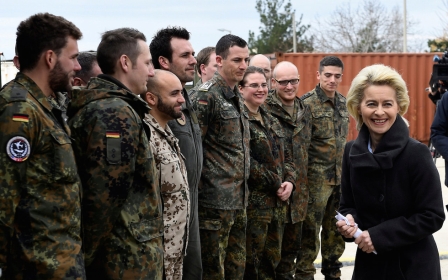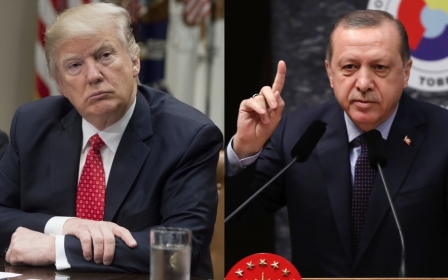Turkey calls for US anti-IS envoy to be replaced over alleged support for PKK

Turkish Foreign Minister Mevlut Cavusoglu said on Thursday he wanted Brett McGurk, the US special envoy to the coalition against the Islamic State group, removed from his post, saying he supported Kurdish militants.
Cavusoglu was speaking in an interview with broadcaster NTV after returning from a visit with President Tayyip Erdogan to Washington where they met President Donald Trump.
Ankara regards the Syrian Kurdish YPG militia, which is a US ally in the fight against Islamic State, as an extension of the Kurdistan Workers Party (PKK) militant group fighting a decades-old insurgency in southeast Turkey.
But last week the Pentagon said it was directly arming YPG fighters as they moved towards IS's Syrian stronghold of Raqqa.
"Brett McGurk, the USA's special envoy in the fight against Daesh (Islamic State), is definitely and clearly giving support to the PKK and YPG. It would be beneficial if this person is changed," Cavusoglu said.
In what was seen as a striking criticism from a NATO ally, President Erdogan said earlier this week that he hoped the Trump administration would reverse its decision to arm the Syrian Kurdish militant group.
Turkey will respond to Kurdish attack 'without asking anyone'
His comments came during a visit to Washington to meet Trump, where he said Turkey would hit back "without asking anyone" if it came under attack from Syrian Kurds.
"We clearly told them this: if there is any sort of attack from the YPG and PYD against Turkey, we will implement the rules of engagement without asking anyone," Sabah newspaper cited him as saying. The PYD is the YPG's political arm.
However his visit was overshadowed by violent clashes outside the Turkish ambassador's residence, which police described as a "brutal attack on peaceful protesters".
That incident prompted a furious response from senior Republican lawmaker John McCain on Thurday. He told broadcaster MSNBC that the Turkish ambassador should be thrown "the hell" out of the country over the incident.
He said: "I’m still outraged at this Turkish beating. We should throw their ambassador the hell out of the United States of America. This is the United States of America, this isn’t Turkey. This isn’t a third world county. This kind of thing should not go unresponded to diplomatically and maybe in other ways."
He added that those responsible should face charges. "These are not average people. This is Erdogan's security detail. Somebody told them to go out there and beat up on these peaceful demonstrators."
Cavusoglu also used the wide-ranging interview to tell Germany that it is free to withdraw its troops stationed at Turkey's Incirlik air base if it wants to, adding Berlin should drop its "patronising approach" to Ankara.
'Brett McGurk ... is definitely and clearly giving support to the PKK and YPG'
- Mevlut Cavusoglu, Turkish Foreign Minister
His comments come after Germany said on Wednesday it was considering moving troops deployed at Incirlik to Jordan because Ankara refuses to grant German lawmakers access to the site.
Germany has about 250 military personnel stationed there, flying Tornado surveillance missions over Syria and refuelling flights for partner nations battling Islamic State fighters.
Turkish officials have told Reuters the visit by lawmakers would not be appropriate at the moment.
Turkey rejected the latest lawmakers' visit because of anger over Germany granting political asylum to some of its military officials since last year's failed coup against President Erdogan, German foreign ministry spokesman Martin Schaefer suggested earlier this week.
Cavusoglu also risked raising the diplomatic pressure with NATO further, labelling the recent measures taken by the alliance to protect Turkey's airspace as insufficient.
Turkey, a NATO member, has seen ties strained with other members of the alliance, particularly Germany, in recent months. Cavusoglu intervention comes ahead of next week's NATO meeting in Brussels
The NATO meeting is likely to see US military commanders again float the idea of the alliance assuming some responsibility for training troops in Iraq after Islamic State forces there are defeated.
The idea was first floated late Wednesday by General Joe Dunford. He told reporters that the 28-member Atlantic alliance "might be uniquely posturing to provide a training mission for an enduring period of time" in Iraq.
"You might see NATO making a contribution to logistics, acquisitions, institutional capacity building, leadership schools, academies - those kind of things," Dunford, who is Chairman of the US Joint Chiefs of Staff, said.
Tensions within NATO
The issue is at the top of the agenda for next week's summit, with US President Donald Trump pushing the allies to take on a greater role in combatting terrorism.
After months of brutal, street-by-street combat, IS has lost control of most of its stronghold of Mosul in Iraq, while the militants have become largely isolated in Raqqa in neighbouring Syria.
Tensions within NATO came as the United Nations warned that up to 200,000 more people could flee Mosul as fighting intensifies between Iraqi forces and IS militants in the city.
"As military operations intensify and move closer to Mosul’s Old City area, we expect that up to 200,000 more people will flee,” Lise Grande, the UN's Humanitarian Coordinator for Iraq said in a statement.
However, Dunford said a change in who leads the training mission to Iraq would not see NATO troops on the ground in Mosul or Raqqa, Dunford said.
"We are not talking about NATO doing what we are doing now for combat advising in places like Mosul or Raqqa," the general said.
"I don't think we are at the point now where we can envision or discuss NATO taking over" all missions of the anti-IS coalition in Iraq, he added.
But France and Germany are thought to be resisting the plan to increase NATO's role in Iraq.
Among theirs concerns are that NATO might be caught up in another costly, Afghan-style deployment, it could upset Arab nations and that it could risk a dangerous confrontation with Russia in Syria.
"They are not buying it," a senior European NATO diplomat told Reuters. They added that some other nations including Greece and Italy were also wary of the plan.
"They want to know what difference would it make. All 28 NATO allies are already part of this effort," the diplomat said, referring to a 68-nation US-led coalition against Islamic State that includes all NATO members.
French and German officials declined to comment, but German Chancellor Angela Merkel left open the possibility of NATO as an institution joining the coalition when she met NATO Secretary General Jens Stoltenberg last week. Both ruled out any combat role for NATO in Syria and Iraq.
New MEE newsletter: Jerusalem Dispatch
Sign up to get the latest insights and analysis on Israel-Palestine, alongside Turkey Unpacked and other MEE newsletters
Middle East Eye delivers independent and unrivalled coverage and analysis of the Middle East, North Africa and beyond. To learn more about republishing this content and the associated fees, please fill out this form. More about MEE can be found here.




